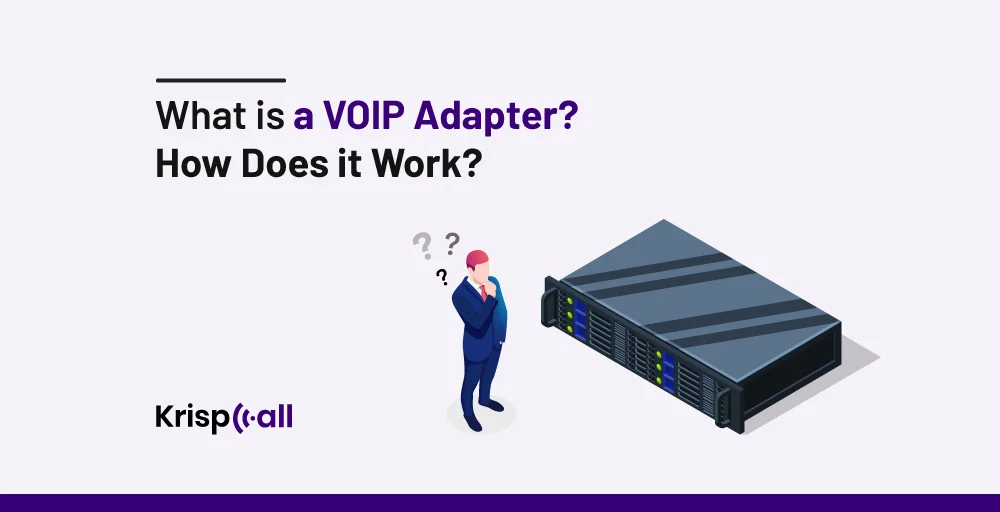In today’s world, the VoIP phone system has become an excellent phone service for businesses of all types and sizes. It offers a versatile and cost-effective alternative to traditional phone systems ☎️ while enabling the exchange of voice communication over the Internet.
At the heart of this technology lies the VoIP adapter, which works as a 🌉 bridge for transforming analog signals into digital signals. Want to know more about VoIP adapters? Then, keep reading this blog.
This blog will discuss details about VoIP adapters, their benefits, types, and how they work. We’ll also provide recommendations for the Top Five VoIP adapters in the market and offer some tips on choosing the right one for your needs. Let’s dive in!
🔑 KEY HIGHLIGHTS
- A VoIP adapter is a device used to make landline calls over the internet using VoIP technology.
- VoIP adapter works as a bridge for transforming analog signals into digital signals.
- Two types of VoIP adapters: Single FXS VoIP adapter and Dual FXS VoIP adapter.
- The Five Best VoIP adapters available in the market include Grandstream HT801 ATA, Poly OBiWiFI5G, Cisco SPA 122, Ooma Telo Air, and Grandstream (HT813).
What is a VoIP Adapter?
A VoIP adapter is a small and simple device that transforms voice signals from traditional analog telephones into digital Internet Protocol (IP) using the Internet.
VoIP adapters are also known as Analog Phone Adapters ( APA) and VoIP modems. They let you enjoy VoIP services without replacing your analog equipment. Some VoIP adapters are Grandstream HT801 ATA, Poly OBiWiFi5G, Cisco SPA122, Mugast VoIP gateway, and Grandstream (HT813).
How does a VoIP Adapter Work?
A VoIP adapter works by connecting your IP network to your analog devices (such as phones) or PSTN lines. It connects to your Local Area Network (LAN) via an RJ45 port and ethernet cable and analog devices through an FXS port.
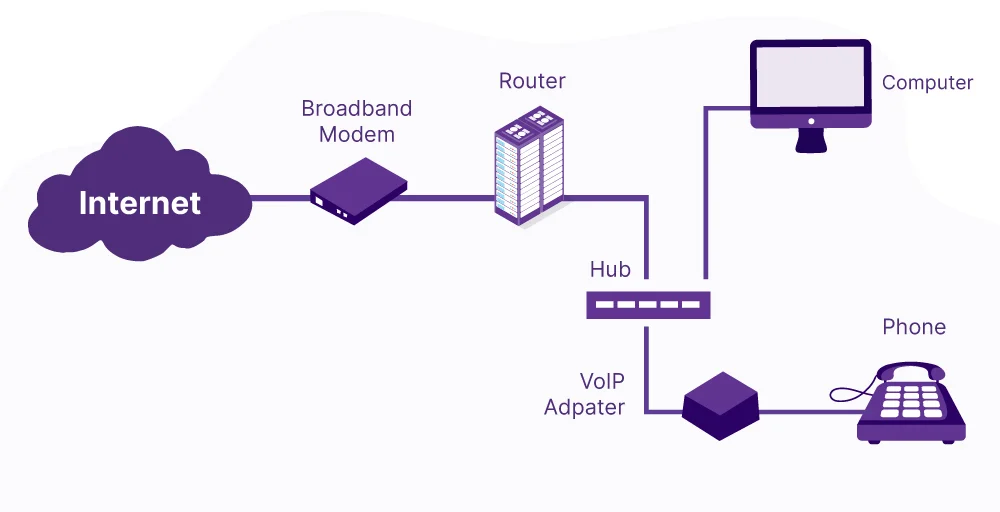
When you initiate a call from an analog device, the VoIP adapter, using a codec, converts the analog voice signal into a digital packet. This digital voice packet is then transmitted through the LAN to the Internet, using signaling protocols like SIP. The VoIP service provider decodes the digital packets and directs them to the recipient’s device, which converts them back into analog audio.
Conversely, when a call originates from a digital device on the IP network, the VoIP adapter receives digital voice packets, converts them into analog signals, and transmits them to the device via the FXS port.
This way, the VoIP adapter acts as a bridge that seamlessly links digital and analog communication.
Benefits of VoIP Adapter
Any business looking for efficient and cost-effective telecommunications solutions has likely used a VoIP telephone system. A VoIP adapter is one tool that allows companies to take advantage of VoIP service.
Let’s have a look at some of the benefits of VoIP adapters:
- Lower costs: Voice over Internet Protocols use Internet protocol to make calls instead of telephone lines, which is comparatively more affordable than traditional landline phones requiring wires. Also, it does not require expensive hardware; all you need is a smartphone or laptop.
- Flexibility: VoIP enables users to make phone calls from anywhere, providing flexibility that benefits remote workers and businesses with multiple locations. Allowing employees to work remotely contributes to the company’s growth and empowers your workforce.
- Service mobility: VoIP works over the internet, allowing users to work from any location, eliminating the stress of moving hardware, and allowing the company to change work locations easily.
- Scalability: A VoIP system and adapters don’t require a complex network. As long as your materials are compatible with VoIP, you won’t have to rewire any hardware, phones, or headsets.
Types of VoIP Adapter
There are two types of VoIP adapters: Single and Dual FXS VoIP adapters, which differ based on their port system.
1. Single FXS VoIP Adapter
As the name suggests, a single FXS VoIP comes with a single FXS port, which only allows you to connect one phone or landline at a time.
This type of adapter is ideal if you only need to integrate one analog device with your VoIP setup. In addition, these adapters are affordable and perfect for small businesses and people who work remotely.
2. Dual FXS VOIP Adapters
Dual FXS VoIP adapters feature two FXS ports, allowing you to connect two separate analog devices, such as phones or fax machines, to your VoIP system simultaneously. This setup helps you use multiple landlines or analog devices with your VoIP service.
Dual FXS VoIP adapters are suitable for businesses or individuals who require multiple connections and flexibility in their communication setup.
5 Best VoIP Adapters in the Market
There are many VoIP adapters on the market with various features and functionalities. We have categorized the best VoIP Adapters based on efficiency, reliability, and cost affordability.
Some of the best VoIP adapters in the market are:
1. Grandstream HT801 ATA
Grandstream HT801 ATA is a single FXS VoIP adapter. It is an excellent adapter for home, office, or small business. It is advantageous when connecting your laptop remotely with your company phone system. It can be managed and deployed quickly.
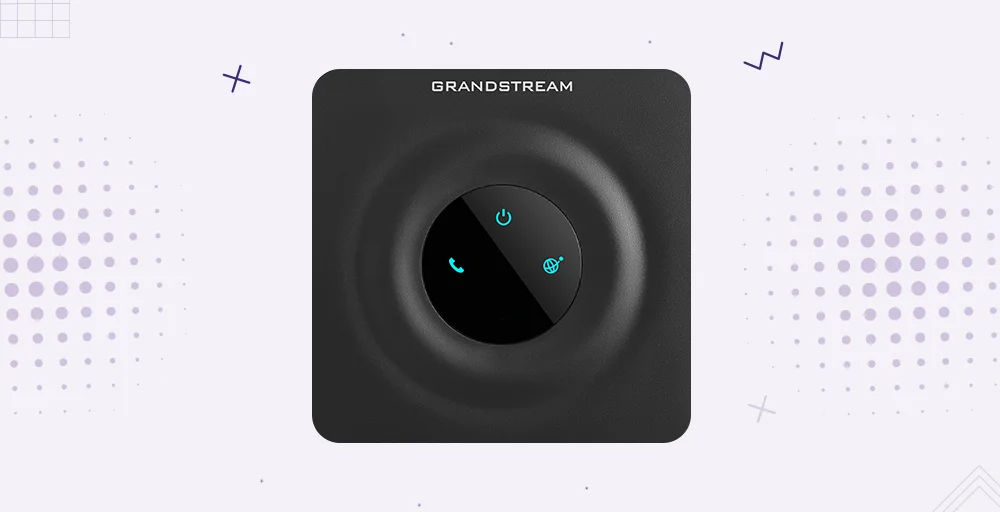
With the HT801, users can easily connect analog devices to a powerful VoIP network while enjoying powerful VoIP technology and routing capabilities. Moreover, it offers exceptional voice quality in diverse applications and environments because it is built using Grandstream’s industry-leading SIP ATA/gateway technology.
Top Features
- Offers TLS and SRTP security encryption technology.
- Fax-over-IP supports a broader range of formats.
- It supports a wide range of caller ID formats.
- Supports 3-way conferencing.
Pros
- Small size with a modern look.
- Complete VoIP features like 3-way conference, call forwarding, call transfer, etc.
- Top encryption with a unique security certificate for each device.
Cons
- It requires a physical ethernet cable.
- Mainly focuses on only voice calls.
- The code provider limits the range of services.
Pricing
According to eBay, the Grandstream HT801 ATA costs $34.00.
2. OBi300 1 Port ATA
The OBi300 1 port ATA allows you to use your analog devices with any SIP trunking provider. All you have to do is plug it into your internet router and connect your analog phones or fax machines to it.
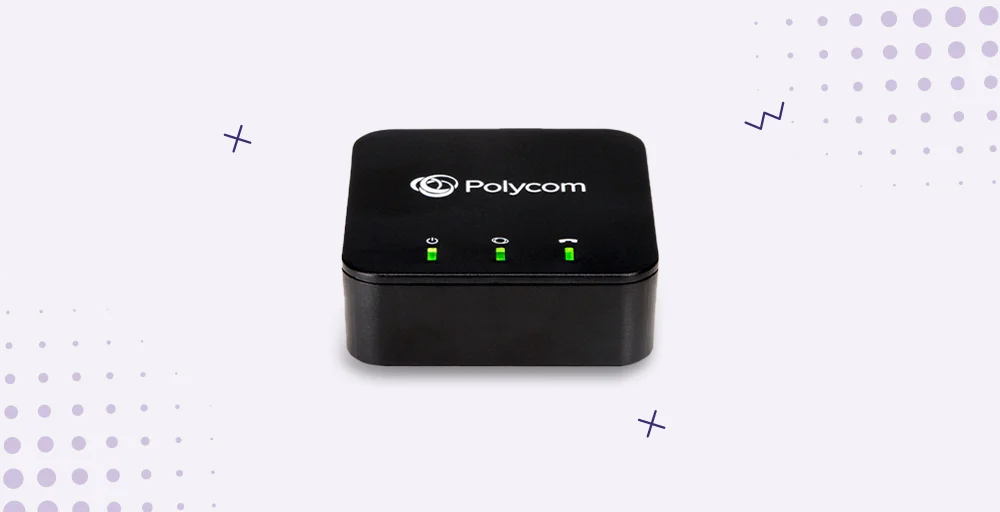
Once you connect it and pair it with an SIP service provider, you’ll unlock a bunch of cool features. These features include speed dial, three-way conferencing, caller ID, call forwarding, call waiting, etc. This adapter is suitable for small businesses looking for a small phone system.
Top Features
- Three-party conference Cclling with local mixing.
- Support for 4 SIP accounts.
- Zero-touch configuration.
- Speed dialing of 99 OBi endpoints or numbers.
Pros
- Works with the professional version of Google Voice.
- Zero-touch configuration.
- Supports many VoIP features.
Cons
- Doesn’t work with the free version of Google Voice.
- Difficult to set up.
- Expensive
Pricing
According to eBay, the price of the OBi300 1 port ATA is 49.99$.
3. Cisco SPA 122
Cisco SPA 122 has a small design that works well with international voices. It can help you provide the best connection for your employees and customers.
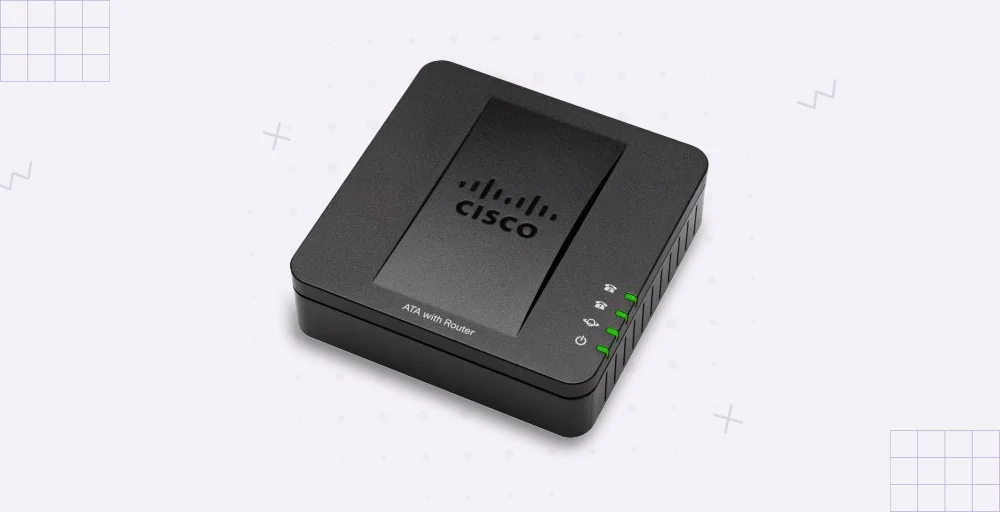
It is designed to be compatible with residential, office, and small VoIP businesses in a complete IP center environment. It is easy to use and provides advanced features to connect employees and customers on a highly secure Cisco network.
Top Features
- Outstanding security.
- Toll-quality voice and carrier-class feature.
- Full duplex audio in voice.
- Perfect for home or office setting.
Pros
- Easy to install.
- It offers features like caller ID, call waiting, call forwarding voicemail, etc.
- Provides high-quality, clear voice calls.
Cons
- It might be challenging for new users.
- It is not compatible with every device and service.
- Some occasional glitches have been reported.
Pricing
According to eBay, the Cisco SPA122 dual FXS port costs around 35$.
4. Ooma Telo Air
Ooma Telo Air VoIP adapter is ideal for home workers. It connects its users with high internet speed and provides a quick and easy installation process.
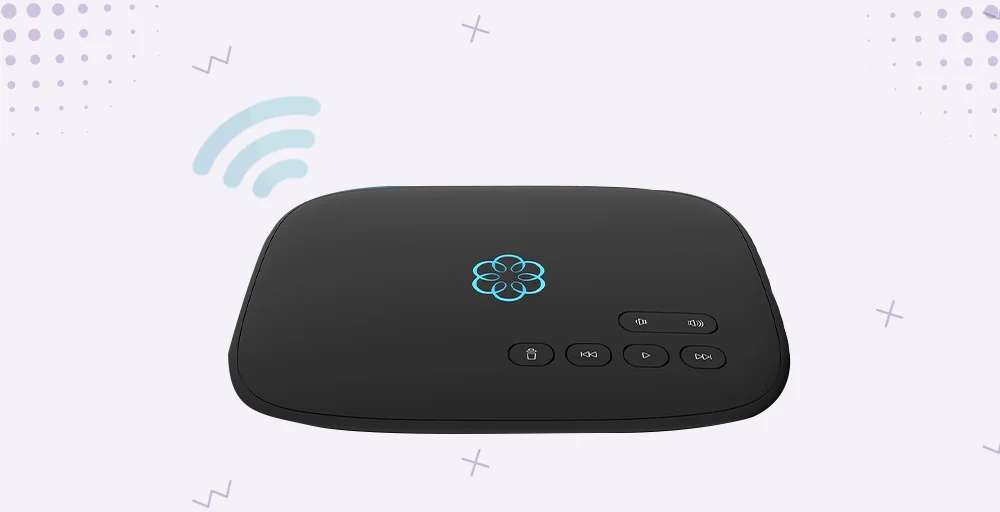
It is a wireless accessory VoIP adapter that connects phones from your Wi-Fi network to an Ooma Telo base station. This adapter can also connect to your mobile phone, allowing you to reply to incoming calls from any phone.
Top Features
- Easily connected with WiFi.
- Produce low-cost international calls.
- Supports VoIP features like call forwarding, call waiting, robocall blocking, etc.
- Mobility
Pros
- There is no extra charge with unlimited high-quality nationwide callings.
- Easy installation.
- Includes essential phone features for better experience and security.
Cons
- You should pay monthly taxes and fees.
- It only works in the USA.
- Limited accessibility.
Pricing
According to eBay, the Ooma Telo Air costs around 36$.
5. Grandstream Hybrid ATA with FXS and FXO Ports (HT813)
Grandstream (HT813) is an analog telephone adapter that offers advanced functionalities, providing one FXS port and one PSTN line FXO port. This integration supports calling to and from the PSTN line. This adapter allows users to switch from analog technology to VoIP.
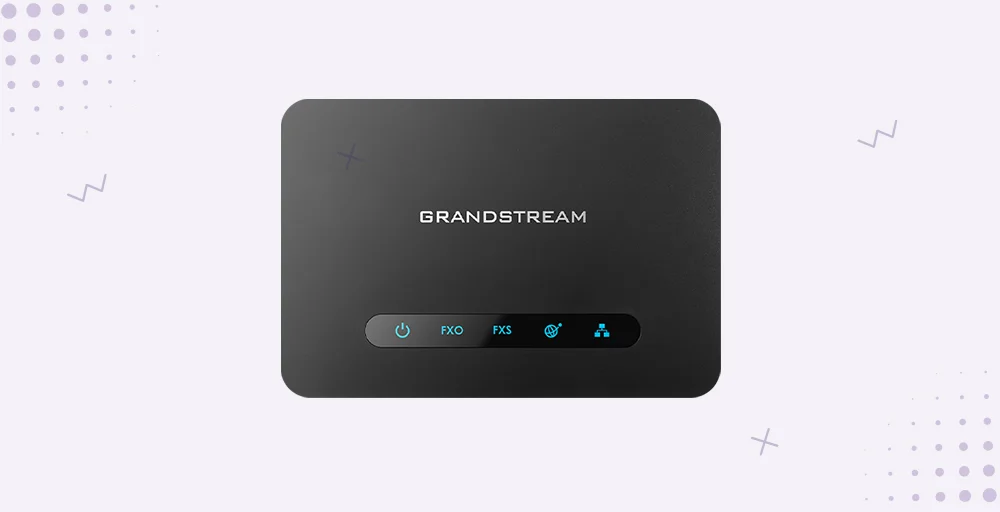
Similarly, Grandstream Hybrid ATA with FXS and FXO Ports adapter provides advanced VoIP functionality and high-end security protection, which allows it to offer high-quality IP service. It provides AES encryption, including a security certificate per unit, making it reliable and a good choice.
Top Features
- Provides each FXS port and PSTN line FXO port.
- HD voice quality and lifeline support.
- It enables receiving and making calls from the PSTN line and VoIP service on a single analog device.
- Dual 100Mbps LAN and WAN ports.
Pros
- High-end security protection.
- Advanced features for high-quality IP service.
- Users can switch from analog technology to VoIP.
Cons
- It might take more time to configure to maintain control over it
- It still maintains the port line after you hang up, but you can set a maximum call duration while making short calls to eliminate this problem
- Some users stated that the configuration instructions were unclear.
Pricing
According to eBay, Grandstream Hybrid (HT813) costs around 58.19$
How are Voip Adapters Helpful for businesses?
VoIP adapters play a crucial role in modern business communications. They allow users to use the Internet instead of requiring traditional telephone hardware.
VoIP adapters can help businesses in specific areas such as:
1. Improves Communications with Essential Features
VoIP adapters benefit new VoIP phones and allow traditional telephones to access advanced features. With the VoIP adapters, you can access enhanced features such as call forwarding, multimedia messaging, call analytics, IVR, etc.
These features can boost the workflow by streamlining call management, automating tasks, and making it more beneficial for businesses.
2. Online Faxing
A VoIP Fax adapter allows businesses to send and receive faxes seamlessly, eliminating the need for extra hardware or a landline. Companies can scale their faxing capabilities without any limitations of traditional fax infrastructure.
3. Automated Systems Integration
VoIP allows automated systems integration, which helps streamline call routing in both digital and analog. Integrating an automated system enables dialers to connect to the right department, eventually enhancing callers’ experience and boosting efficiency.
4. Efficient Call Queuing
VoIP adapters enable call queuing and manage incoming calls from customers or clients, maximizing efficiency and improving customer service.
These features make VoIP adapters, including phone and VoIP adapters for landline phones, indispensable tools for businesses looking to enhance their communication capabilities.
How to Choose the Best Voip Adapter for your VOIP Phone
Having all the benefits of VoIP adapter, choosing the best VoIP can be hectic work. If you are planning to use a VoIP Adapter for your VoIP phone, then you should keep these things in mind:
1. How many devices do you need to connect?
First, you must be sure how many telephones you will use and whether there are any faxes. One FXS port can be enough for a single phone, but if you use multiple phones or faxes, the need for an FXS port rises, too.
2. Want to Keep the traditional phone network (PSTN) or not?
PSTN is unnecessary when Wi-Fi or the internet works smoothly, but some businesses keep their PSTN just to have a backup in case of internet issues.
3. Do you need a router to make it work?
If you need a router for your VoIP service or lack an ethernet port, you’ll require a VoIP adapter equipped with a built-in router.
4. Which adapter would be the best choice for your business?
Since the VoIP service provider market is highly competitive, you can research multiple service providers and decide on the type of adapter you are interested in. Before setting up a VoIP adapter, it is essential to consider the benefits and possible challenges.
Conclusion
VoIP adapters are vital tools that fill the gap between traditional analog telephones and modern VoIP networks. They connect your IP network to your analog devices and facilitate seamless voice communication over WiFi or any other internet connection.
Some of the best VoIP adapters available in the market include Grandstream HT801, Poly OBiWiFI5G, Cisco SPA122, Ooma Telo Air, and Grandstream Hybrid ATA HT813.
If you plan to buy any of the VoIP adapters we listed here, you should ask these questions: How many devices do you want to connect? Do you need an additional router? Which type of VoIP service provider suits your business? Finally, Don’t forget to decide according to your budget.

